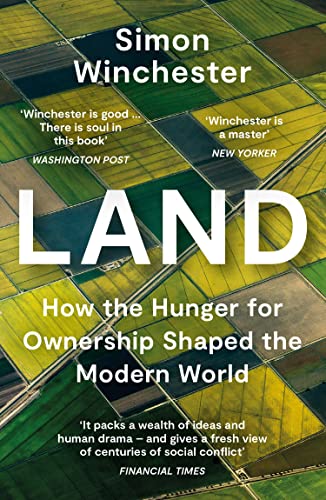

William Collins Land: How the Hunger for Ownership Shaped the Modern World
C**S
Interesting and thought provoking
I am enjoying reading the hard back version. Some interesting chapters recounting some lesser known land disputes and historical background
N**S
Satisfactory
This is a series of monographs on land, most quite interesting, but without an over-arching theme or thesis, except perhaps that concentration of land ownership is bad and that native peoples have been wronged. And this is fine as far as it goes. One chapter on land trusts, reviewing various models at a high level, was frustratingly parsimonious about how the arrangements actually worked, and the nomenclature was confusing. The description of how a land trust has elevated Cleveland was particularly lacunate. But I can't understand how the author effusively thanks his Harper Collins editors. I found a shocking incidence of sentence fragments, clumsy or ungrammatical constructions, and typographical errors. This was quite astonishing for an established publishing house. It may reflect an overall lack of unifying, scholarly rigour. But as stated, most of the chapters were quite interesting in themselves and worth reading.
F**Y
good
another wonderful book
A**S
Informative and very interesting
Liked it all.
J**D
Unputdownable
It's almost become a banality to say of a book "I couldn't put it down," but in the case of Land I found it to be the truth. Simon Winchester's newest offering provides a rich collection of fascinating material, well presented in fine English prose that's actually a joy to read. From the introduction detailing Winchester's purchase of some land along the New York-Connecticut border to the conclusion warning of the effects of climate change are some 400 pages of vividly told tales, all of them in one form or another detailing humanity's complex relationship with the ground at our feet.I find it difficult to single out any particular segment of Land for special praise because they are all so remarkable. I suppose the stories of the dispossession and removals of the Native Americans in the United States during the 1830s had special resonance for me, as did those recounting the lengthy and ambitious efforts to create elegant and highly accurate maps of the entire planet. Perhaps the most memorable chapter is the one in which he tells the story of Akira Aramaki, a Japanese-American who was one of the many thousands forced to abandon their property and move into camps far from their homes during World War II. When he was finally released he discovered that his home was now in the hands of others, and that there was nothing he could do about it. It was also interesting to read of the development of community-based ownership in Scotland and elsewhere. But really, it would be impossible to find a chapter or page of Land that isn't fascinating and informative.Over the years I've read many of Simon Winchester's books and enjoyed them all, but I believe Land is his best work yet.
Trustpilot
2 weeks ago
2 weeks ago